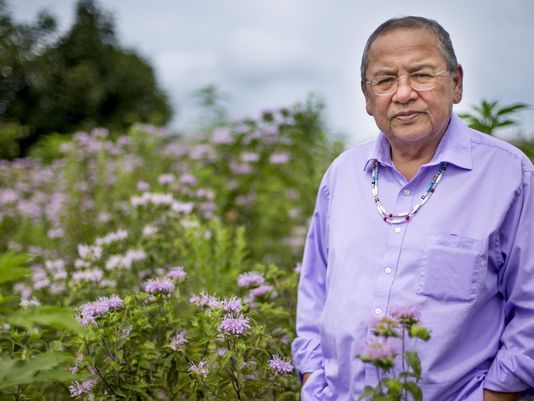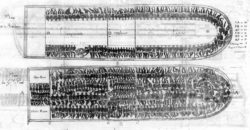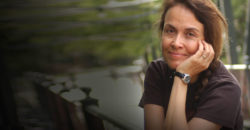poets remember the absence of their grandfathers

Born in 1950, Ray Young Bear was raised on the Meskwaki (Red Earth People) Settlement in central Iowa. He graduated high school in 1969, the year he began publishing poetry, and attended Pomona College from 1969 to 1971. He has also attended the University of Iowa, Grinnell College, Northern Iowa University, and Iowa State University.
His books of poetry include Manifestation Wolverine: The Collected Poetry of Ray Young Bear (Open Road Media, 2015), The Rock Island Hiking Club (University of Iowa Press, 2001), The Invisible Musician (Holy Cow! Press, 1990), Winter of the Salamander: The Keeper of Importance (Harper & Row, 1980), and Waiting to be Fed (Graywolf Press, 1975).
Young Bear is also the author of Black Eagle Child (University of Iowa Press, 1992) and Remnants of the First Earth (Grove Press, 1998), which received the Ruth Suckow Award as an outstanding work of fiction about Iowa.
Young Bear has received numerous honors and awards, including a 2016 American Book Award, a fellowship from the National Endowment for the Arts, and an honorary doctorate in letters from Luther College, Decorah, Iowa. He has taught creative writing and Native American literature at The Institute of American Indian Art, Eastern Washington University, Meskwaki Elementary School, the University of Iowa, and at Iowa State University. Young Bear and his wife, Stella, also co-founded the Woodland Singers and Dancers.
Among his accomplishments, Young Bear cherishes the ability to speak and write in his first language. He presently lives on tribally owned land that was established by his maternal grandfather, a hereditary Chief, in 1856.
In the First Place of My Life
In the first place of my life
something which comes before all others
there is the sacred and holylike
recurring memory of an old teethless
bushy white-haired man
gesturing with his wrinkled hands
and squinty eyes for me to walk to him
sitting on the edge of his wooden
summer bed
being supported and guided along
like a newborn spotted fawn
who rises to the cool and minty wind
i kept looking at his yellow
and cracked fingernails
they moved back and forth against the stove
and they shined against the kerosene-
darkened
kitchen and bedroom walls
i floated over the floor towards him
and he smiled as he lifted me up to the
cardboard
ceiling and on there were symbols i later read
as that of emily
her scratched-in name alongside the face
of a lonely softball plater
remembrance two: it was shortly after he
held me
or else it was a day
or a couple of months
or a couple of years later when i saw him next
the bodies of three young men leaned against him
as he staggered out towards the night
i never knew what closed him
why i never saw him again
he was on the floor with a blanket
over his still and quiet body
above me there was a mouth moving
it was the face of a woman who had opened
the door for the three young men
she pointed to his body
this is your grandfather
and then i remember the daylight
with the bald-headed man in overalls
he too mentioned the absence
of my grandfather
i understood them both
i picture the appletree and its shade
as he was talking to me i saw a group
of people on the green grass
on the ground were table and linen cloths
with bowls and dishes of fruits and meats
the bald-headed man in overalls stood
in the brilliance of the summer daylight
his eyebrows made his face look concerned
or worried
later he stood on the same grass
he had been chosen to fill my grandfather’s
empty place
the new colored blankets around his waist
and chest glistened with fresh
fibrous wool
the beads reflected the good weather
the earth and its people stood and danced
with the beautifully clothed man
who was my grandfather
standing in between time
watching the daylight pass through
his eyes
from then on i only saw him occasionally
he would stand on his tractor
waving to each passing car on the road
as he drove home from
the soybean fields
or else he would converse with my two uncles
that the blood which ran through their
father’s veins
and theirs was unlike the rest of the tribe
in that it came from the beginnings
unlike ours









